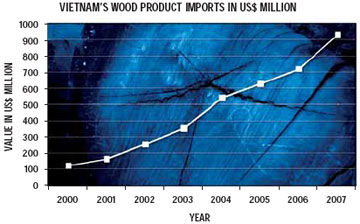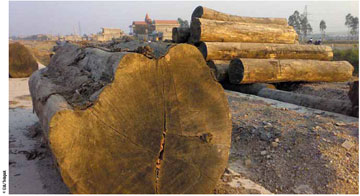U.S. furniture demand drives illegal logging in Laos
U.S. furniture demand drives illegal logging in Laos
Jeremy Hance, mongabay.com
March 24, 2008
Illegal wood for Vietnamese factories devastates forests in the Mekong region of Laos. Western desire for cheap wood furniture at blame
In Vietnam the illegal timber trade continues unabated, in many ways due to the Southeast Asian country’s growing economy and wealthy nations’ insatiable demand for cheap furniture. Since 2000 Vietnam has seem a ten-fold increase in their furniture industry, a rise that is leading to large-scale illegal deforestation in the Mekong region, according to a report by the Environmental Investigation Agency (EIA) and Telapak Indonesia.
Undercover investigations by EIA and Telapak revealed that Laos now provides the majority of illegal timber to Vietnam’s furniture plants. The environmental groups estimate that 500,000 cubic meters of logs find their way from Laos to Vietnam every year.
Laos itself sees little profit in this trade.

|
“The cost of such unfettered greed is borne by poor rural communities in Laos who are dependent on the forests for their traditional livelihoods,” said Julian Newman, head of EIA’s Forest Campaign, while noting that eighty-percent of Laos’ population lives in rural areas. Further, while the Lao government has hard-line taken logging, the illegal trade is facilitated by corrupt local and military officials. The illicit proceeds end up in hands of businesses and traders in Vietnam, Thailand, and Singapore — as well as among bribed officials in Laos.
Industrialized countries play a key role in the trade — ninety percent of the furniture built in Vietnam is exported. The top six importers are the US, Japan, UK, Germany, France and China.
“The ultimate responsibility for this dire state of affairs rests with the consumer markets which import wood products made from stolen timber,” said Newman. “Until these states clean up their act and shut their markets to illegal wood products, the loss of precious tropical forests will continue unabated.”
The United States is by far the worst of these importers: in 2007 the US imported 930 million dollars worth of Vietnamese furniture — well over a third of Vietnamese total furniture exports.
 Yellow balau log from Laos outside Taianh factory. The firm is a major trader in logs from Laos. Courtesy of EIA |
The loss of these forests in the Mekong region produces a web of negative impacts. Endangered species such as the tiger, Malaysian Sun Bear, the Asian Elephant, and the Clouded Leopard are increasingly threatened by habitat — not to mention the thousands of amphibians, reptiles, birds, insects, and plants that are endemic to the same forests. Deforestation along Southeast Asia’s longest river system has also led to erosion and increased flooding, endangering river communities and agriculture. The illegal industry also puts rural people’s livelihoods in jeopardy by destroying the resources they rely upon. Finally, the logging of such forests results in large amounts of carbon into the atmosphere, worsening climate change. It is currently estimated that 15-20 percent of the world’s annual carbon emissions comes from tropical deforestation, much of it illegal.
The report recommends that the US, EU, Japan and China quickly adopt national laws to prohibit illegally harvested wood from their markets. In the meantime, consumers should “only buy wood products independently verified as legally sourced, with a transparent and full chain of custody,” says EIA.
BORDERLINES: Report revealing how Vietnam has become a hub for processing huge quantities of unlawfully-logged timber from across Indochina, threatening some of the last intact forests in the region.













